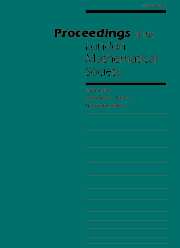Uniform Abel–Kreiss boundedness and the extremal behaviour of the Volterra operator
Published online by Cambridge University Press: 19 October 2005
Abstract
Let $V$ denote the classical Volterra operator. In this work, sharp estimates of the norm of $(I - V)^n$ acting on $L^p [0, 1]$, for $1 \leq p \leq \infty$, are obtained. As a consequence, $I - V$ acting on $L^p [0, 1]$, with $1 \leq p \leq \infty$, is power bounded if and only if $p = 2$. Thus the Volterra operator characterizes when $L^p [0, 1]$ is a Hilbert space. By means of sharp estimates of the $L^1$-norm of the $n$th partial sums of the generating function of the Laguerre polynomials on the unit circle, it is also proved that <formula form="inline" disc="math" id="frm012"><formtex notation="AMSTeX">$I - V$ is uniformly Kreiss bounded on the spaces $L^p [0,1]$, for $1 \leq p \leq \infty$.
A bounded linear operator $T$ on a Banach space is said to be Kreiss bounded if there is a constant $C > 0$ such that $\Vert (T - \lambda)^{-1} \Vert \leq C( | \lambda | - 1)^{-1}$ for $| \lambda | > 1$. If the same upper estimate holds for each of the partial sums of the resolvent, then $T$ is said to be uniformly Kreiss bounded. This is, for instance, true for power bounded operators. For finite-dimensional Banach spaces, Kreiss' Matrix Theorem asserts that Kreiss boundedness is equivalent to $T$ being power bounded. Thus, in the infinite-dimensional setting, even a much stronger property than Kreiss boundedness still does not imply power boundedness. It is also shown that, for general operators, uniform Abel boundedness characterizes Cesàro boundedness and, as a consequence, uniform Kreiss boundedness is characterized in terms of a Cesàro type boundedness of order 1.
Keywords
- Type
- Research Article
- Information
- Proceedings of the London Mathematical Society , Volume 91 , Issue 3 , November 2005 , pp. 761 - 788
- Copyright
- 2005 London Mathematical Society
Footnotes
- 28
- Cited by




